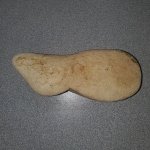LuckyLarry
Hero Member
- Dec 16, 2005
- 750
- 390
- Detector(s) used
- I had to sideline for awhile, too much quarreling, brand defensiveness, and seeing certain people waging war on others. It got to be too silly for me after awhile..
- Primary Interest:
- Other
Has anybody ever tried the Omega 8000, G2, or Fisher Gold Bug Pro, on Oregon or Washington State high black-sand/salt beaches? And if not how about the Headhunter PI? I may wind up with two of these in the not-so-distant future. Thanks folks, and HH
LL
LL




